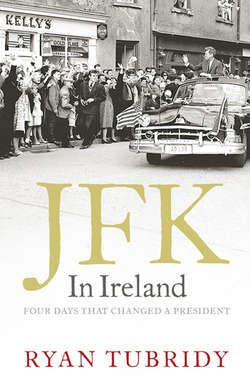Читать книгу JFK in Ireland: Four Days that Changed a President - Ryan Tubridy - Страница 17
Finding a reason to visit
ОглавлениеThe dispatches from the embassy in Washington back to the Department of External Affairs in Dublin suggest that Kiernan and Kennedy were discussing the possibility of a visit to Ireland by early 1962. Writing to C.C. Cremin in May 1962, Kiernan explained that Kennedy had expressed an interest in making a special visit to Ireland and not just one that was tacked on to some other journey (which is exactly what would happen). The problem for the President was that he needed what Kiernan called an “occasion”. Kennedy said he would visit without such an event but that a justifiable reason for the trip would be preferable.
Kiernan wracked his brains. De Valera had visited America before, so he wondered whether they could present this as a return visit: “I had thought of President de Valera’s eightieth birthday next October, which would be an occasion for the timing of a return visit by Kennedy; but there is no visit of President de Valera to return … I wonder if I [should] throw out the idea of reciprocity, for the visit of our President, as justification for a return visit?”41 The arguments didn’t stack up, though, since it was some time since de Valera’s last visit.
Kiernan would go on to suggest the unveiling of a plaque at the Kennedy homestead in Dunganstown, County Wexford, or the naming of the Agricultural Institute after the President as a thank–you for the American aid which had helped in its establishment.42 The Ambassador was adamant in his dispatches that the conferring of an honorary university degree would not constitute enough of an occasion. He described them as “small change in the United States” and added “the President has picked up twenty–three in his first year”. He felt the President wanted “all the works” when he did arrive officially in Dublin and felt that they needed to devise a carefully planned, worthwhile occasion.Still Kiernan hung back, sending a note to the State Department in May 1962 suggesting that a formal invitation should only be made as soon as the President was able to accept. The move was on, the interest was intensifying but there was just one more big push required to set the wheels in motion.
Before that could happen, in June 1962, the President had a diplomatic appointment to make. The American Ambassador to Ireland, Edward Stockdale, was going home and Kennedy decided to appoint Matt McCloskey, a Philadelphia businessman and major Democratic Party fundraiser to the job. McCloskey threw himself a party and gave a speech that instantly rubbed Kiernan up the wrong way with an emphasis that he considered anti–Irish. He wrote later that the new man was “not in the least Irish or interested in Ireland; that he had never attended anything Irish in his life; that on St Patrick’s Day he went about his business as usual; that he resented very much this nonsense in America of Irish–American; and that he was 100 per cent American.”
Kiernan was livid as he sat watching his diplomatic counterpart rubbishing the country and the culture he had been appointed to. Worse was to come when McCloskey quoted an Irish expression in the national tongue. “I’ll go to Ireland as ‘Mr America’ and I’ll say when I get there Fág an Bealach.”
Kiernan, a published scholar and fluent native speaker knew immediately what the round, ruddy Ambassador was saying. The expression was an old Irish war cry that translated roughly as “Get out of my way!” Kiernan noted wryly: “You say it when you’re going to cut a fellow’s head off.”
It was a dreadful start to the new appointee’s term of office. McCloskey was obviously another Ambassador chosen for his wallet rather than his diplomatic skills, but Kiernan had been around the block and knew how to circumvent such people. “He showed himself to me, ‘Mr Bad Mannered American’ and he lived up to that reputation right up to the end.”
They never got on but Kiernan still kept nurturing the President, waiting for the right moment to strike, watching for the tipping point.
